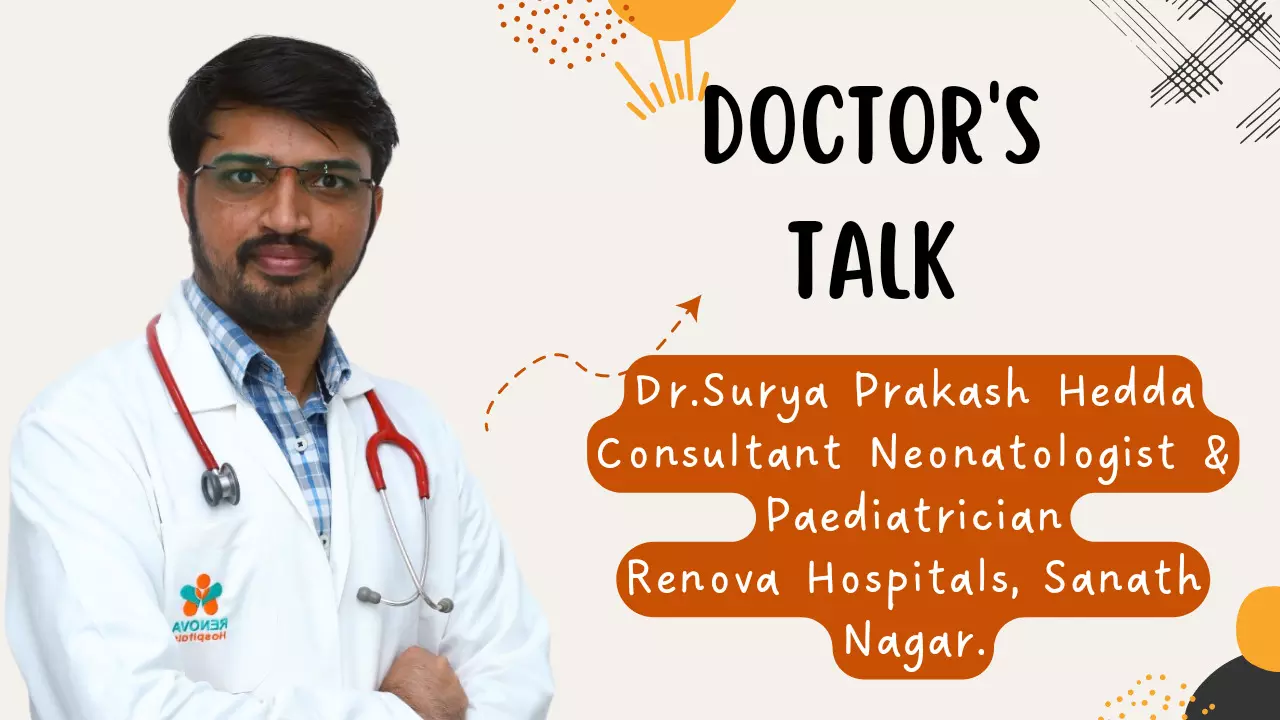Neonatologist Dr Surya Prakash Hedda aims to give normal life to preterm babies
Survival is just the first step. We aim to give them a normal life.
By Sumavarsha kandula
Hyderabad: Lifestyle changes have led to many health issues, and one of the areas that have been affected considerably is women's health during pregnancies and the subsequent health of the newborn.
To understand the challenges faced by pediatricians and neonatologists, NewsMeter spoke to Dr. Surya Prakash Hedda, consultant neonatologist and paediatrician at Renova Hospitals, Hyderabad.
When asked why he chose pediatrics, Dr. Hedda said, "From my undergraduate days, I was interested in the care of newborns. In the case of other adult or older patients, they can express the issue or specify the symptoms, but in newborns, the sole responsibility is on the doctor, so that's how it is more challenging."
After his postgraduation, Dr. Hedda pursued a fellowship in neonatal medicine. "This specialty deals with babies under one month, including premature babies," he explained.
Premature deliveries
Any baby born before the complete gestation period, 37 weeks, is considered pre-term.
About the increase in the number of premature babies, Dr. Hedda said change in lifestyle is one reason. "Due to urbanisation, people are planning children late, and as a result, normal conception also has gone down. When pregnancy is through IVF, chances of premature deliveries are high," he said.
Talking about the challenges with premature babies, he said, "Survival is just the first step. We aim to give them a normal life."
He further added, "Childbirth is a complex situation. A lot of emotion is associated with the event, the whole family is involved. So, it becomes all the more delicate to deal with it."
Advancements
Speaking about the advancements in medicine, the doctor said, "Now, we are equipped to deal with extreme pre-term, that is babies born before 28 weeks."
He continued, "Previously, parents would lose hope if the child was born before 28 weeks. But it is not like that now. We have gadgets that are meant to act like a 'novel warmer' that keeps the baby warm during incubation. So there are different treatments, different guidelines, and different methodologies. Even 24 weeks, 25 weeks can be safe."
The doctor said just survival is not enough. "The baby's future also is normal. Brain development is normal. In 2-3 years, one would forget the baby was premature," he added.
Immunization
Asked if people's perception of vaccines and immunization has changed in any way, he said it has since the pandemic. "People witnessed the importance of vaccines and science. Even before that, it was maybe 10% of people who were apprehensive because they would have seen some side effects in other kids," he remarked.
About advancement in vaccines, he said, "Pneumonia was the number one mortality factor in newborns, but now there is a vaccine for that also. With awareness programmes and social media, people are better informed and are opting for vaccines," he said.
Challenges faced by parents
Speaking about the trauma faced by parents, the doctor said, "Seeing the child in an incubator, with all the tubes, is not easy for any parent, and things are more complicated with the cost factor in the Indian context."
But those equipment and treatment, he said, are needed for the baby to be normal again.
Covid-19
When asked about post-Covid complications, he said they saw many more cases of multi-system inflammatory syndrome and 'Kawasaki' disease. "The symptoms are similar, but first, we need to rule out other infections," he said.
The multi-system inflammatory syndrome and Kawasaki disease symptoms include vomiting, abdominal pain, and diarrhea. Gastrointestinal symptoms tend to be more prevalent in MIS-C compared to Kawasaki disease, possibly due to increased viral load in gastrointestinal tract tissues.
Speaking about viral infections, he said they are not fatal but more symptomatic.
Advice to parents
Dr. Hedda said prevention is better than care. It is better to avoid IVF pregnancies as much as possible, he said and suggested having good, nutritious food during pregnancy.
"Sometimes, it is unavoidable. In that case, we need to ensure every hospital has all the equipment and care so that the baby survives," he concluded.